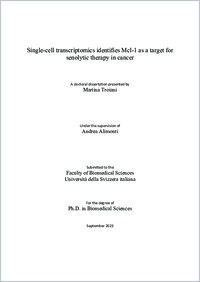Single-cell transcriptomics identifies Mcl-1 as a target for senolytic therapy in cancer
- Troiani, Martina
- Alimonti, Andrea (Degree supervisor)
- 2023
PhD: Università della Svizzera italiana
English
Prostate cancer (PCa) is one of the most diagnosed cancers in men worldwide, prompting extensive research into effective treatment strategies. This type of cancer is an androgen dependent tumor. The initial therapeutic options involve prostatectomy and androgen deprivation therapy (ADT), which in most of the cases is sufficient to treat the cancer. However, in some cases the phenotype of PCa becomes more aggressive, developing resistance to ADT. In this context, chemotherapies and androgen target therapies are needed to control tumor progression. All these treatments aim to trigger apoptosis and programmed cell death. However, new research indicates that most of the anticancer therapies in clinics can induce senescence; consequently, cancer cells use cellular senescence as an alternative survival strategy to avoid apoptosis. Cellular senescence is a state in which cells don’t divide and undergo a stable irreversible growth arrest. Various internal and external factors, including normal aging processes, DNA damage, stress, cellular insults, and therapies can trigger this phenomenon. Since senescent cancer cells stop proliferating, cellular senescence initially acts as a protective mechanism against tumor progression and initiation of potential malignancies. However, senescent tumor cells, despite being non-proliferative, remain metabolically active and exhibit a distinct secretory phenotype, called senescence-associated secretory phenotype (SASP), which contribute to tumor progression, proliferation, and metastasis over time. For these reasons, the elimination of detrimental senescent cells using specific drugs named senolytic is needed. In this PhD project, we have used single-cell RNA sequencing as a powerful technique to investigate in depth the survival mechanisms of senescent tumor cells. I have developed a bioinformatic algorithm named Senescence Index Tool (SIT), to identify senescent cells in two prostate cancer mouse models, the Ptenpc-/- and the Ptenpc-/-; Timp1-/-. The SIT is based on two main features of senescence: the upregulation of canonical senescence markers and the cell cycle arrest. In this context, the antiapoptotic gene Mcl-1 has been identified as a key player in the survival of senescent cells. Remarkably, Mcl-1 shows elevated expression levels in senescent tumor cells, including the senescent cells where Bcl-2, a well-known senolytic target, is expressed at low levels. We have investigated both in vitro and in vivo the potential of targeting Mcl-1 as an innovative senolytic therapy in comparison with Navitoclax, the gold standard used in the clinics. While the Bcl-2 inhibitor Navitoclax demonstrated efficacy in reducing metastases, the Mcl-1 inhibitor S63845 resulted in the complete elimination of senescent tumor cells and the associated metastases. MCL-1 also emerged as a pro-survival factor of senescent cells in the application of SIT on datasets of human single-cell RNA sequencing. Moreover, the SASP analysis in the human senescent cells highlighted the presence of factors involved in the promotion of migration of tumor cells, enhancing the role of senescence in promoting metastases. In conclusion, in this project, we have discovered that, although senescent tumor cells are a heterogenous population, they rely on Mcl-1 for survival. Indeed, a potent senolytic therapy targeting Mcl-1 impacts metastases outcomes. By expanding our comprehension of prostate cancer possible treatment, this research offers a promising opportunity to enhance therapeutic effects and counteract aggressive phenotypes and therapy-induced senescence.
- Collections
- Language
-
- English
- Classification
- Medicine
- License
-
License undefined
- Open access status
- green
- Identifiers
-
- NDP-USI 2023BIOMED004
- ARK ark:/12658/srd1326572
- URN urn:nbn:ch:rero-006-121588
- Persistent URL
- https://n2t.net/ark:/12658/srd1326572
Statistics
Document views: 241
File downloads:
- 2023BIOMED004: 17
